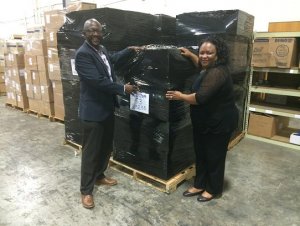By KABS KANU :
If you were one of the Sierra Leoneans in the diaspora who blamed President Ernest Koroma on hearing that the banks in Sierra Leone were not liberal in honoring withdrawal slips this Christmas and that fuel shortages in some areas caused queues, you wait until the new year kicks in properly. Serious economic setbacks that are about to affect even the most industrialized and the richest countries in Europe and North America will affect you so bad you will wonder what hit you. The whole global economy is in serious crisis.
Already, New Jersey to New York commuters have started singing the blues. The thousands upon thousands of workers on both sides of the two states who commute everyday to New York or New Jersey to look for their daily bread have started making plans to use public transportation –buses and trains- and ditch their vehicles because the dramatic new increases in tolls in bridges and tunnels will rip holes in their pockets. Whenever you cross a toll booth on your commute between New Jersey and New York, you are going to feel mugged. It is going to cost a commuter $15 one way and $30 for the day , making it a total of $ 150 a week just to move to and fro to work. Paying $600 monthly just on tolls will certainly not be the best way to pamper already shaky personal finances. But that was not what was on the mind of the Port Authority of New York and New Jersey when they announced steep increases in tolls beginning from January 2012. And you have not counted your lunch and your spending at the fuel pump.
This will be the second toll increases at these tolls and bridges in three months. When the first increases took place in September, the NEW YORK TIMES reported the economic hardships the increases created :
“ Before the September toll increase, Erica Yahr had driven into Manhattan from Montclair, N.J., one to two days a week for the past 15 years. She is no cheapskate: She recently splurged on an iPad, often has lunch at Pret a Manger and has dinner out. But now she takes the train every day. ”
“I will not drive in on my own dime anymore,” Ms. Yahr said. “It just has to do with how big of a hike at one time that they did. It’s just obnoxious.”
“Longtime bus and train riders have also noticed the change. Michael Catchpole, who has been taking the Decamp 33 Grove bus into Manhattan for the past three years, said that before the toll increases, he could find a seat four days a week, but he is now lucky to sit once a week.”
“Two to three days a week, he said, buses are so crowded that they do not stop at all. ’Suddenly there was barely even room to stand on the bus,’ he said. ”
The U.S . will be lucky if it did not edge into full-blown recession this year . According to the Morgan Stanley Global Economic Forum’s Global Economic 2012 outlook, “We expect upcoming policy decisions in the US and Europe to hold the key to the global growth outlook. With a recession in Europe, anaemic growth in the US and a further dimming of emerging market economies’ growth prospects as our base case, we see global growth falling below its long-term average. ”
Morgan Stanley went on : “Our bear case is a full-blown recession, and it won’t take much to tip the balance. Our base case assumes that European governments make a big step towards fiscal integration soon that stabilises confidence, and that US Congress extends most of this year’s stimulus. Against the backdrop of recent policy mistakes, these assumptions may seem heroic. Failure on these fronts would risk a full-blown recession in the US and Europe, with global GDP growth falling below the 2.5% recession threshold. ” Already, there is a freeze on employment in the U.S. and jobs are very hard to find. Workers are being retrenched or forced into involuntary retirement. Concurrently, mortgages are skyrocketting ; the gas companies have hiked their rates and Americans are paying out of their noses to heat their homes this winter. Utility bills are at an all-time high and all people seem to do these days is pay bills. According to the British DAILY MAIL : “There are fears that the mighty U.S. economy could slide back into recession and drag the rest of the world down with it”.
In Europe, the debt crisis is crippling the single currency, the Euro. As far back as August, the European Commission President Jose Manuel Barroso “conceded for the first time that major eurozone economies are now in danger “, according to the DAILY MAIL. The newspaper reported that “British taxpayers have already stumped up around £13 Billion to rescue Greece ,Ireland and Portugal with Rome and Madrid tipped as the next dominoes to fall. ”
With struggling African economies integrated into the world economy, there is no way that they will not be seriously affected by these trends in the global economy. It is therefore stupid when some of Sierra Leone’s so-called intellectuals who dabble in Economics fail to acknowledge this linkage and blame the All People’s Congress ( APC ) Government WHOLLY AND SOLELY whenever we too have our economic hiccups. The recent apparent liquidity problem and the queues for petrol saw some SLPP commentators lose their heads once again .To them, there could have been only one reason for these problems : Ernest Koroma. Every problem in Sierra Leone is caused by Ernest Koroma. Nobody is creative any more with the pen to postulate more creative solutions for our problems . Nobody is investigative any more.
Since they are partisan politicians given to capiltalizing on anything to make their Sierra Leone People’s Party (SLPP) look good and the APC bad, these dishonest and rogue Sierra Leoneans snap on any unfavourable economic circumstance to propound confusing economic theories to blame President Koroma and the APC Government , even though they know within their hearts that our economic problems are the result of the effects of the global economic downturn. To show how irredeemably dishonest these economic commentators are, they live in Britain and the U.S. and see the economies of these countries falling apart all around them but they write as if it is only in Sierra Leone that these bleak economic trends occur. Some of them are suffering from the painful pinches of the global economic quagmire .They have either lost their jobs or if still employed they find that all their earnings are funnelled into ever-escalating bills . Many of them are one paycheck away from bankruptcy. This is very sad because they do not deserve it. They are very qualified people and are working diligently at their jobs but the U.S and the industrialized countries are also neck-deep in economic mess. Hardship is starring every common man in the face and some have to do two jobs just to survive but when they write, it is as if economic problems exist only in Sierra Leone.
While dishonest SLPP economic commentators are breathlessly trying to disconnect any linkage between the global economic crisis and our economic woes , as far back as 2009, the United Nations Economic and Social Council (ECOSOC ) Economic Commission For Africa during the 28th meeting of its committee of experts in Cairo, Egypt, to consider the effects of the global economic downturn on African economies, acknowledged that “The impact of the crisis on Africa comes from both direct and indirect channels. The direct effects have been felt mostly through the financial sector. For example, stock market volatility has increased since the onset of the crisis and wealth losses have been observed in the major stock exchanges. In Egypt and Nigeria, the stock market indices declined by about 67 per cent between March 2008 and March 2009. Significant losses have also been observed in Kenya, Mauritius, Zambia and Botswana. The turmoil in African stock markets is beginning to have significant negative effects on the financial sector and on aggregate demand. For example, there is growing evidence that it has a negative effect on bank balance sheets and, if present trends continue, non-performing loans in the banking sector would likely increase, with dire consequences for financial stability in the region. In Ghana, the ratio of non-performing loans to gross loans increased from 7.9 per cent to 8.7 per cent between 2006 and the third quarter of 2008. In Lesotho, it increased from 2 per cent to 3.5 per cent over the same period (IMF 2009).”
What SLPP economic commentators would also not want you to see is that ECOSOC also acknowledged that a country need not have bad economic policies to be affected by the global economic crisis. The organization stated that ”It is also interesting to note that the crisis is affecting all categories of countries in the region those considered to have good economic policies and governance .. ” In fact, the organization lamented that “The crisis represents a serious setback for Africa because it is taking place at a time when the region is making progress in economic performance and management.”
Owing to the global economic situation, ECOSOC also acknowledged that ”The foreign exchange markets of African countries have been under enormous pressure since the onset of the crisis. In the first quarter of 2009, the Ghanaian cedi depreciated against the United States dollar by 14 per cent and the Nigerian naira declined by 10 per cent. The Zambian kwacha also lost 13 per cent of its value relative to the United States dollar over the same period. “ And these are countries that were not affected by war. Sierra Leone’s economy was completely destroyed by an 11 year war that brought the nation to its knees. If countries like Ghana, Nigeria and Zambia that have been relatively stable are having their currencies depreciated in value by the global economic crisis, what about Sierra Leone that is emerging from war ? ECOSOC warned that : “Exchange-rate depreciation will also increase exchange-rate risks faced by domestic firms and increase the likelihood that they will default on loans owed to domestic banks, thereby increasing the vulnerability of these banks.” The dishonest journalists of the SLPP were so disingenuous they did not even make efforts to investigate why we had the recent liquidity crisis, if at all. Their obsession with the “Ernest Koroma did it” sing-song was sufficient . To them, it was enough that it happened. If one were to go into the archives, it would be seen that these same SLPP commentators putting all the blame on the APC now were the very ones blaming the global economic crisis when the SLPP had these same economic setbacks. It is a disgrace that our so-called BOOK PEOPLE have become intellectually dishonest because of their political partisanship. While they were making it look like that it is only in Sierra Leone that these problems happen, Liberia was undergoing the same problem. People were finding it difficult cashing their checks or withdrawing money from the banks. ” Toe-line ” for fuel happens on a case-by-case instance in various African capitals and cities at different times .The problem is not peculiar to Sierra Leone alone. People form queues for petrol even in oil-producing Nigeria.
The dishonest SLPP economic commentators also fail to acknowledge the fact that the SLPP ruled at a time of relative economic prosperity in the world. The SLPP did not have to countenance the distressful economic trends of today and yet they mismanaged the Sierra Leonean economy to such alarming levels that the IMF, the World Bank and our other donor partners pulled out. Support was only resumed after President Koroma came to power in 2007. The APC was unfortunate that as soon as it came to power in 2007, world economies started tailspinning and heading for recession. But if the SLPP commentators were honest , they could have given the APC Government credit for bravely surmounting the odds and still keeping our economic head above the waters in these dire economic times .
The IMF recently released some impressive forecasts about the Sierra Leone economy, including the good news that the economy will experience a 50% growth in 2012. This was what the IMF said about Sierra Leone : “Following a 5 percent growth in real GDP in 2010, economic activity has remained robust in 2011, supported by continued expansion in agriculture and mining. Consumer price inflation increased, however, to 20.9 percent (year-on-year) in July 2011 on account of food and fuel price increases, as well as the effect of expansionary monetary policy in the second half of 2010. Gross international reserves remain at a comfortable level. The Leone has been relatively stable, depreciating by about 4 percent in the first half of 2011, and Treasury bill interest rates have declined. In this respect, the mission commends the authorities for their efforts in containing spending and tightening the monetary policy stance. “ How many SLPP journalists rejoiced at this encouraging news for the nation ?
They complain that rice that was Le 60, 000 a bag in 2007 now costs Le 120, 000. Do they think that these increases occured only in Sierra Leone ? Trying going to any U.S. supermarket or grocery store with the same $100 you once used to purchase the family foodstuffs for the week and see what will be the result. Whereas in the past, the amount will be sufficient, today, it will only get you a few items. You now need to spent $300 where $100 was once sufficient. Up until the year 2000, you could rent a one-room apartment for $500-600 but today even in the lowest communities , you will not pay anything below $1, 500 for the same apartment. Prices of goods and services do not remain stagnant and fixed under the present global economic mess . They keep escalating.
The government must move fast to arrest these problems especially on the eve of elections. The Government must never forget that it is under seige from socio-economic and political saboteurs .Sierra Leoneans are becoming so versed in the art of sabotage that the Government must foresee all possibilities , including the one being touted that anti-government criminals have the capacity to create artificial shortages to place the government in bad light with the people ahead of this year’s elections. The APC Government should no longer underrate the capacity of the SLPP for subterfuge and sabotage. The SLPP is so desperate for power that it will sell the nation’s welfare down the river just to put the APC at odds with the people .
READ PART 2 NEXT WEEK.





Leave a Reply